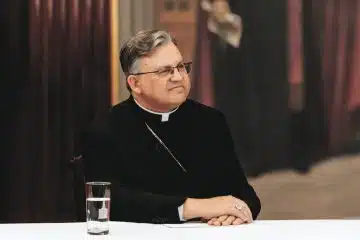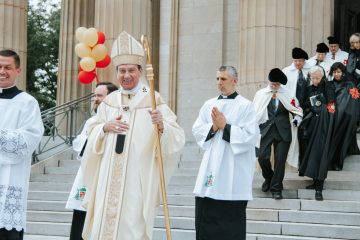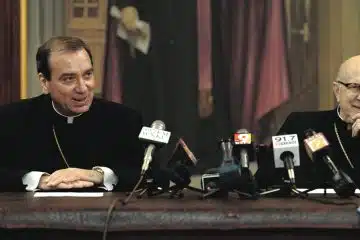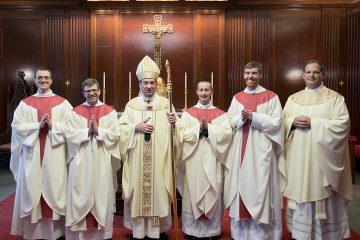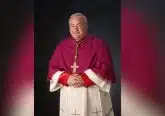Georgia’s Catholic archdiocese, diocese file suit against HHS mandate
October 12, 2012
Catholic News Service
ATLANTA — The Archdiocese of Atlanta, the Diocese of Savannah and other Catholic entities in Georgia, including Catholic Charities and Christ the King School in Atlanta, filed a federal lawsuit Oct. 5 challenging the Health and Human Services’ contraceptive mandate.
The lawsuit was filed in the U.S. District Court in Atlanta. Defendants are the U.S. Department of Health and Human Services and HHS Secretary Kathleen Sebelius; the U.S. Department of Labor and Labor Secretary Hilda Solis; and the U.S. Department of the Treasury and Treasury Secretary Timothy Geithner.
With this action, the Catholic Church in Georgia joins more than 50 other dioceses, schools, hospitals, social service agencies and other institutions that have filed suit in federal court to stop the three government agencies from implementing a mandate that would require most religious employers to provide for free contraceptives and sterilization in their health plans despite their moral objections to doing so.
The lawsuit states that the U.S. government “is attempting to force plaintiffs — all Catholic entities — to provide, pay for, and/or facilitate access to abortion-inducing drugs, sterilization and contraception in violation of their sincerely held religious beliefs.”
Atlanta Archbishop Wilton D. Gregory said the lawsuit was necessary for the archdiocese, because the “stakes are so incredibly high — our religious liberty and that of our fellow Catholics and people of other religious faiths as well as those with no professed religious belief throughout the nation are impacted by this proposed action.”
He also said the “unchallenged results of the HHS mandate would require that we compromise or violate our religious faith and ethical beliefs.”
The lawsuit stated that the archdiocese and other plaintiffs “acknowledge that individuals in this country have a legal right to these medical services; they are, and will continue to be, freely available in the United States, and nothing prevents the government itself from making them more widely available.”
“But the right to such services does not authorize the government to co-opt religious entities like the plaintiffs into providing or facilitating access to them.”
The lawsuit says the First Amendment prohibits “just this sort of overbearing and oppressive governmental action.”
Savannah Bishop Gregory J. Hartmayer said, “Our challenge to the federal mandate is not about whether people in this country should have access to the services covered by the mandate; but rather, it is about the fundamental issue of whether the government may force religious institutions and individuals to fund services which violate our religious and moral beliefs.”
Archbishop Gregory said Catholic Charities Atlanta and Christ the King School joined in the lawsuit, because “the work of the church is represented by many different agencies.”
Charles Thibaudeau, archdiocesan director of human resources, said Christ the King School was selected to be a defendant because it is representative of Georgia’s other Catholic schools.
“It’s our flagship elementary school and one of the largest,” he said.
Catholic Charities Atlanta’s CEO, Joseph Krygiel, said his organization was very much in favor of joining the lawsuit.
He described the HHS mandate as “an attempt by the government to literally secularize all social services provided by Catholic Charities organizations across our country, and to also secularize health care and education provided by Catholic hospitals and schools.”
Catholic organizations have objected to the contraceptive mandate since it was announced last year as part of the Affordable Care Act but as employers they must comply unless they qualify for a narrow religious exemption or have a grandfathered health plan.
Exempt religious entities are those that seek to inculcate their religious values and primarily serve and hire people of their own faith.
Catholic schools, hospitals and charitable organizations would not qualify under that standard, because they serve Catholics and non-Catholics alike, so they either provide coverage they find objectionable; pay steep annual fines to keep provide their current health insurance to employees and, in the case of colleges, to students; or stop providing health insurance entirely.
In response to the criticism, President Barack Obama announced a “temporary enforcement safe harbor,” a yearlong period that protects employers from immediate government action against them if they fail to comply with the mandate. The final rule on the mandate takes effect in August 2013.
He also announced what he called an accommodation, allowing those employers to pass on the costs of the mandated coverage to their insurance carriers or a third party, rather than pay for them directly.
Krygiel said that if Catholic Charities agencies restricted their services to only the Catholic clients they serve, a large percentage of the 18,000 clients the agency helps each year would be in jeopardy.
“We never ask our clients what faith they practice or if they even believe in God before we provide help to them. … We, in fact, witness to our faith each day by this service to the most vulnerable among us by always believing in the dignity of each human person,” he said.
Thibaudeau said that there are about 1,500 employees in the Archdiocese of Atlanta who might lose their health insurance if the mandate stands, plus another 1,500 members of employees’ families receiving coverage under the archdiocesan plan.
All of the employees of the archdiocese could be affected, he said.
Archbishop Gregory said the legal action has been developing “over the past several months with consultation with the USCCB and our lawyers.”
With the lawsuit, “we become one more voice that must be heard by the courts as they consider the legality of this action,” he said.





